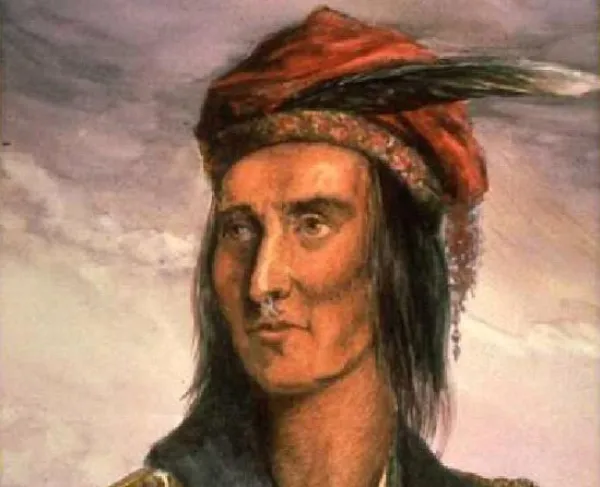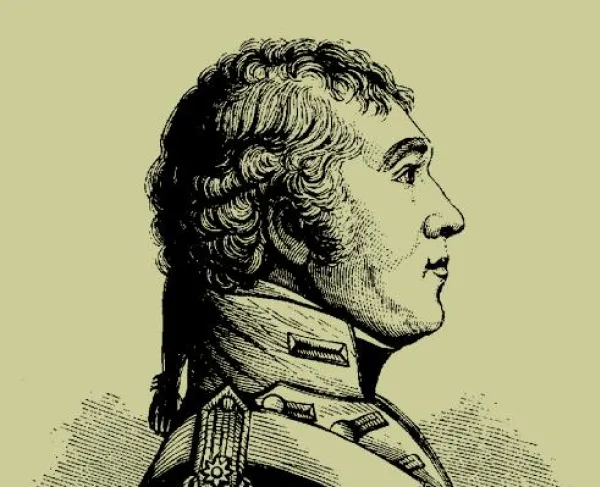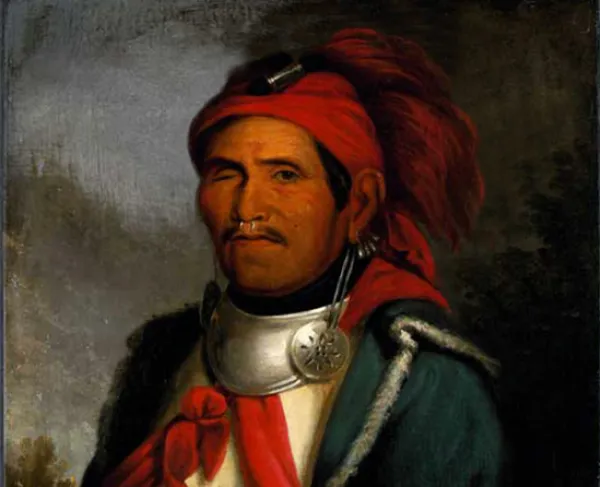Tecumseh

Before Tecumseh, many Native Americans waged war to keep their lands and sovereignty safe from European interference, and readily made alliances with those beyond old tribal affiliations. But very few have embodied a spirit of pan-Indian resistance the way Tecumseh has. Due to the lack of contemporary written sources, it can be difficult to exactly measure his ambitions and accomplishments within the context of other notable American-Indian figures, but his active recruiting well across North America is impressive, all the same.
Tecumseh was born in 1768 in what is now Greene County, Ohio, to a Kispoko Shawnee family of minor import. Tecumseh experienced conflict with white settlers early on. His father, Puckshinwa, died in battle against Virginia militiamen in 1774. Raised by his eldest brother, Tecumseh became a warrior and allied with the British in the American War for Independence. By 1800, Tecumseh had seen almost constant fighting since the age of twelve, and participated in numerous conflicts with settlers and militia by fifteen.
Tecumseh proved himself as a warrior in these wars, but he was thrust further and further into leadership roles when his younger brother shed his old identity and took the name Tenskwatawa, leader of the Purification movement, a nativist religious sect that explicitly rejected Anglo-American ways of living and opposed white expansion into the continent. Tecumseh quickly came forward as his ally. The two brothers founded Prophetstown as the center of their community, but Tecumseh soon began to dream of a larger-scale movement. Here, he transitioned from military leader to political idealist and used his oratorial talent to attract volunteers from around Continental North America, regardless of language or tribal origin. For example, he found some of his most passionate followers among the Muscogee or Creek tribe in modern-day Alabama, whose language was entirely different from Tecumseh's own Algonquian Shawnee. With his encouragement, many Creeks began their own resistance movement called the Red Sticks, and waged their own war against the United States, which gives a sense of the geographic and linguistic divides Tecumseh managed to cross.
Conflict came to a head with the United States government in 1810. Traditional leaders of the various tribes in the Great Lakes area had been encouraging peace and assimilation with the Americans, but Tecumseh argued that the U.S. had no claim to the Indiana territory, allegedly arguing, "Sell a country! Why not sell the air, the great sea, as well as the earth? Did not the Great Spirit make them all for the use of his children? How can we have confidence in the white people?" Tecumseh's Confederacy came to blows with America soon afterwards, with the American troops in the territory led by William Henry Harrison.
In 1811, Harrison defeated Tecumseh's forces at the Battle of Tippecanoe and destroyed Prophetstown, but this did not spell the end for the Shawnee leader. America went to war against the United Kingdom in 1812, at which point Tecumseh and the remnant of his forces struck a deal to support the British. He and his Confederacy fought alongside the British throughout the Great Lakes region, including the capture of Fort Meigs and Fort Detroit. Throughout this time, he continued to spread his message of resistance to various other Native American groups, gathering volunteers from as far south as Chickasaw and Choctaw country. Despite his renewed efforts, he did not have a productive relationship with his British liaison, General Henry Procter. In 1813, Procter actually abandoned Tecumseh at the Battle of the Thames against his old enemy, Harrison. Tecumseh died in that battle, and with him any hopes of reviving his movement against further white settlement in the area.
Despite his fervent anti-European beliefs, Tecumseh became something of a folk hero to both Native and white Americans, who were happy to add on to his legend. Civil War general William Tecumseh Sherman was named after him, for example.
And with the founding of the National Congress of American Indians in 1944, Tecumseh's dream of a pan-Indian political movement was finally realized.
Related Battles
189
120





